
Bears on the homestead is a unique problem to have, but a challenging one too. These predators are big, strong, scary, and can be incredibly persistent. If you have bears frequenting your homestead, it’s time to get it on lockdown. Take every step possible to encourage them to move on.
I do hope this article is taken as it was written, I’m an avid adorer of bears and have been since I was a little kid.
I do not condone harming them in any way, shape, or form.
My efforts in writing this article are to give you some tools to bear-proof your homestead for two reasons. One is to save you the financial and emotional pain of bears doing damage to your property. The second is to protect the bears.
Bears that frequent human areas are more of a danger to themselves than they are to others. These types of bears learn that humans provide easy food and humans aren’t scary. This leads them to come around more and more often and eventually either die from scared homeowners shooting them or eating harmful things.
We want to avoid all of this. Keep you safe, keep your homestead safe, keep the bears safe.
Why are bears drawn to homesteads?
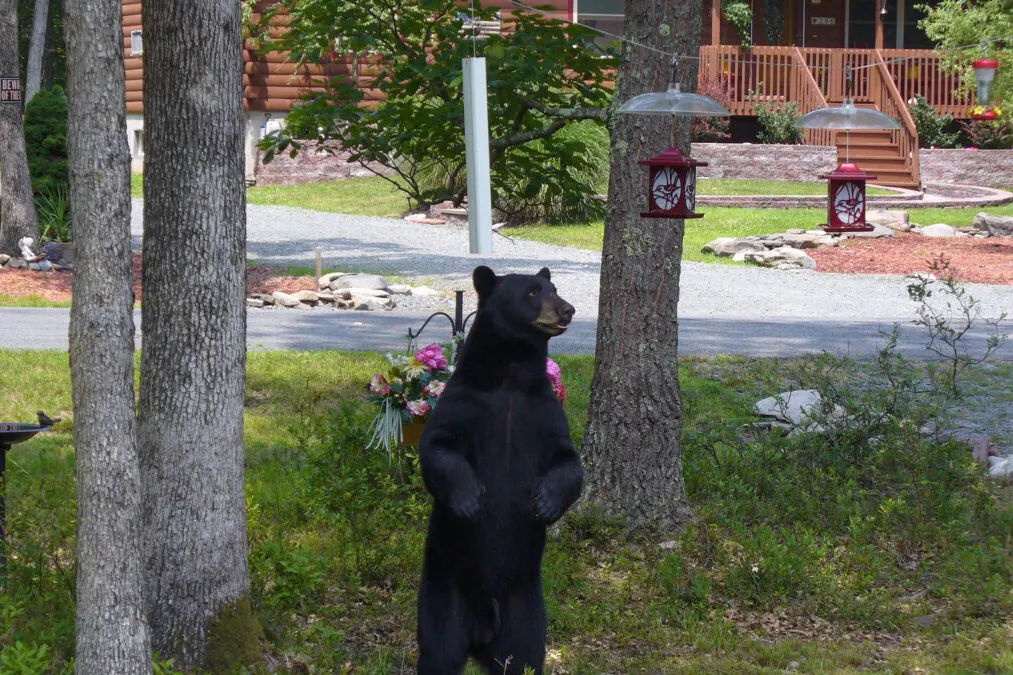
The reasons for bears to be drawn to any particular area are always the same. They’re looking for food, and the easier the meal, the less energy the bear has to invest.
Homesteads are full of easy meals, from livestock and pet food sitting out to beehives full of honey to piles of fresh fruit growing. There are a lot of reasons homesteads are of particular interest to a bear.
What kind of homesteads are most at risk for bears?
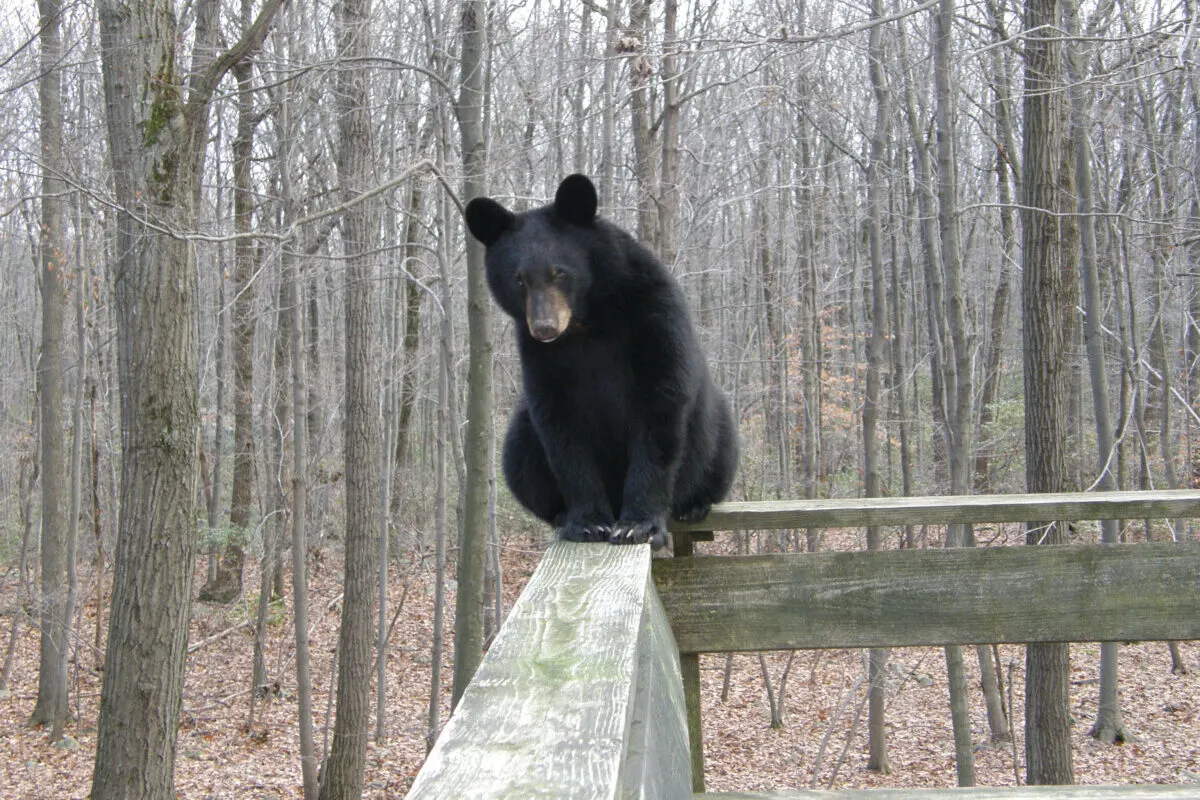
People living in bear country are quite obviously the most at risk for bears on the homestead, but honestly, bears can become a problem practically anywhere.
Bears have been spotted in the suburbs and more populated rural areas as well from time to time, but they clearly don’t belong there.
If you live in a more densely populated area that isn’t known for having a bear population, don’t hesitate to call your local cooperative extension to see about a humane capture and release of the bear to a more suitable area.
This isn’t so much for your benefit as it is for the bears. Bears that hang out in populated areas can die from eating trash or be killed by nervous homeowners.
If, however, you’re homesteading in bear country, you’ll have to learn to homestead alongside the bears.
It’s not exactly fair to expect the bears to be removed from your area; they have as much of a right to live there as you do.
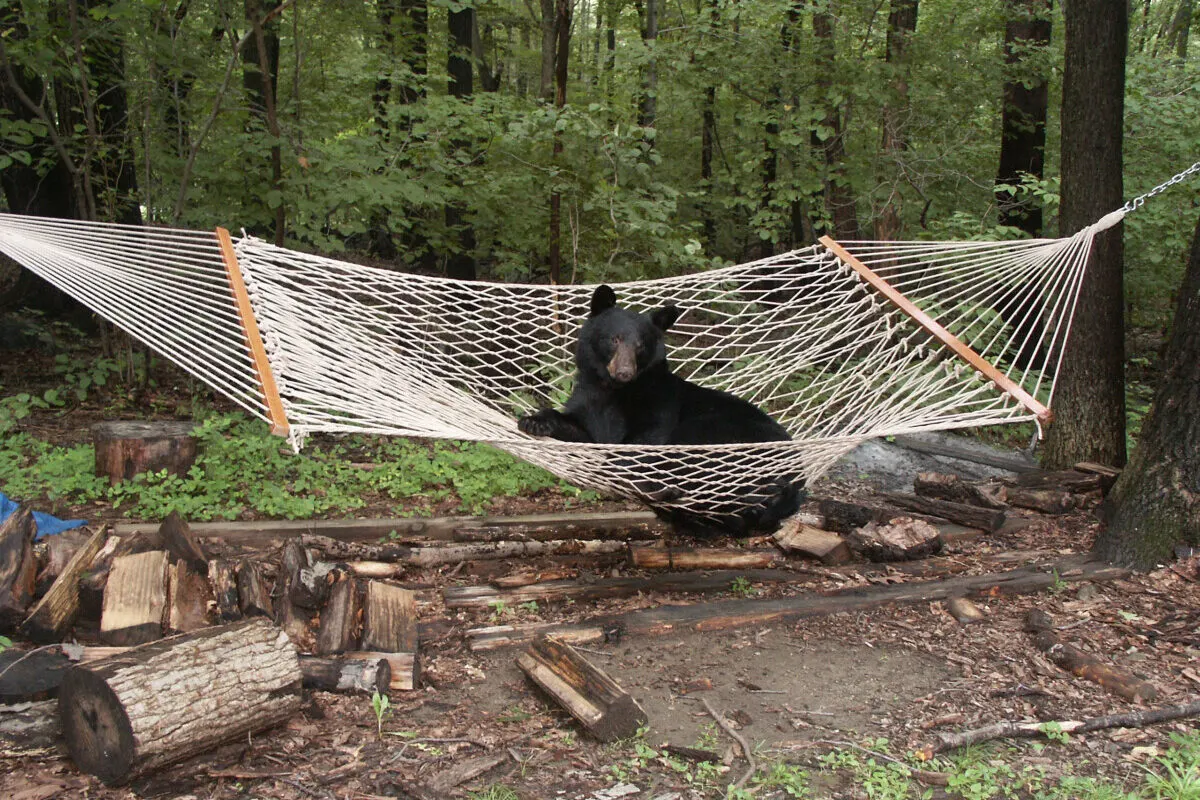
Bears are most likely to become a problem on homesteads that border big expanses of forest.
There are many ways to coexist with black bears. These animals, while intimidating, very rarely attack people, and mostly want to be left alone. Follow the steps below to set up your homesteading activities in a way that will naturally prevent bears from wanting to lunch on your property.
What to do if bears are frequenting your homestead
If you see the bear on your property, stay at a safe distance and make as much noise as possible to try to scare it away.
It’s a good idea to always carry bear spray while outdoors on your homestead if you live in bear country. You just never know when you might run into a bear, and it’s better to be safe than sorry.
Follow the tips below to make your homestead unappealing to bears. If you stop feeding them, they’ll stop visiting.
How to Prevent Bear Visits
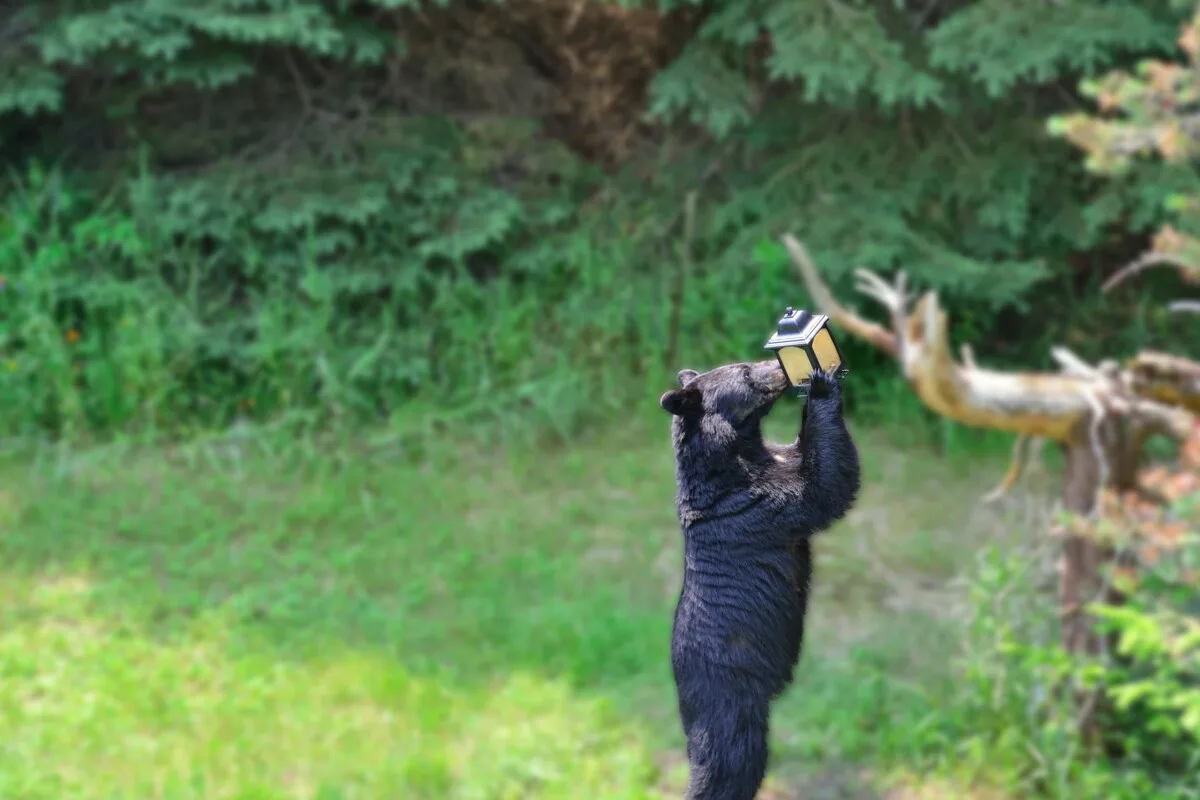
If you have bears coming to your property, it’s likely for one big reason, you’re feeding them, whether you mean to or not. Black bears can smell food from up to 20 miles away, so it’s really no wonder that they frequent homesteads, which are chock full of food.
Biggest bear draws on the homestead:
- Trash or food left outside
- Compost
- Beehives
- Livestock food
- Animals giving birth
- Newborn, injured or dead livestock
- Crops, Berry bushes, fruit trees & nut trees
- Stocked ponds
Never Leave Trash or Recycling Outside
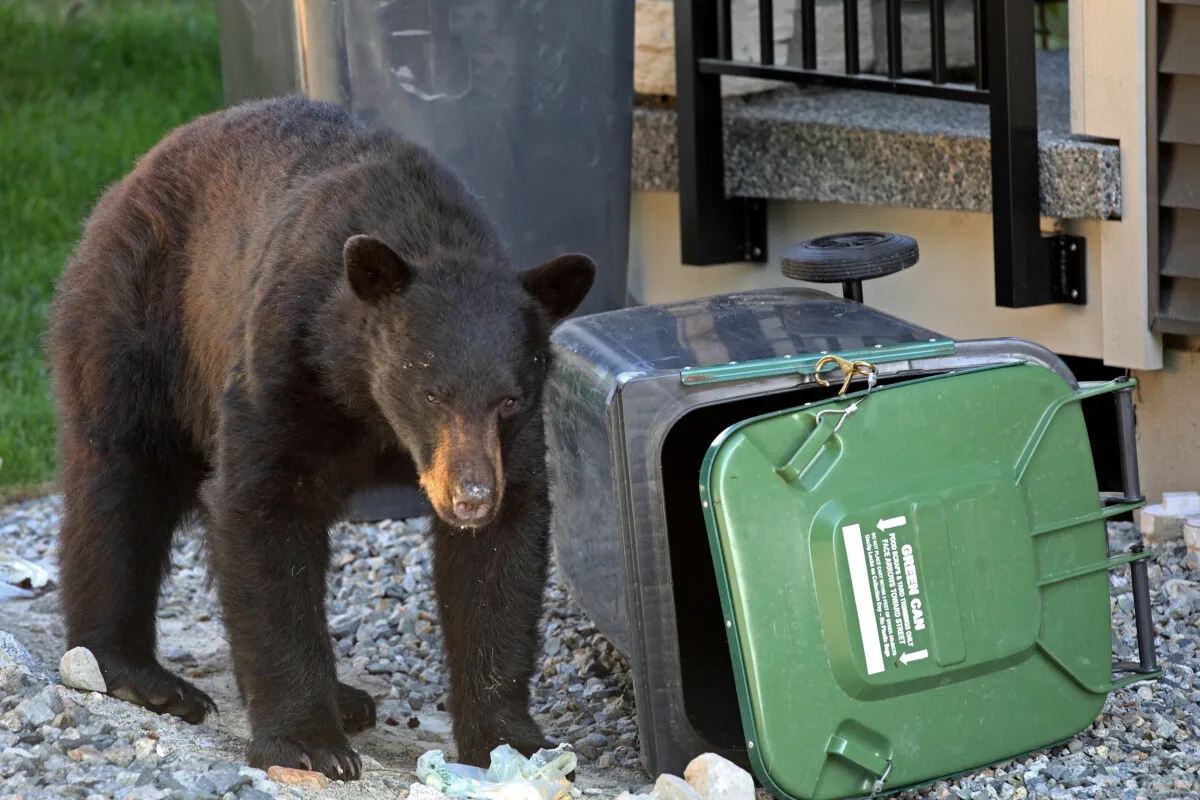
A fed bear is a dead bear, as the saying goes. Bears are very attracted to garbage, and once they realize you have it on your property, you’ll have a hard time getting rid of them.
Bears that eat trash die an early death, either from ingesting something non-edible or becoming so habituated to human areas that they’re killed.
Our neighborhood bear always seems to know when someone is about to head to the dump with their trash. They’ll leave their trash out on the front porch, waiting to get it into the car. And like clockwork, there’s the bear, waiting for a treat.
The only way we’ve found to combat this is to always keep our trash and recycling locked in our shed until it’s time to go to the dump, and then the trash goes straight into the car. It’s a simple system, but it works.
Bear-Proof as Much as Possible.
While black bears are generally not tempted by livestock (unless they’re desperate for a meal), they may be tempted by newborns, chicks, eggs, and especially livestock food.
Bears are wicked strong and can be very determined, especially in their most desperate seasons to eat. Make the effort to build strong animal structures with bear-resistant doors and windows so you don’t have to deal with break-ins.
Related Reading: 10 Common Chicken Coop Mistakes I Wish I Knew Earlier
Lock Animals In at Night and During Baby Season
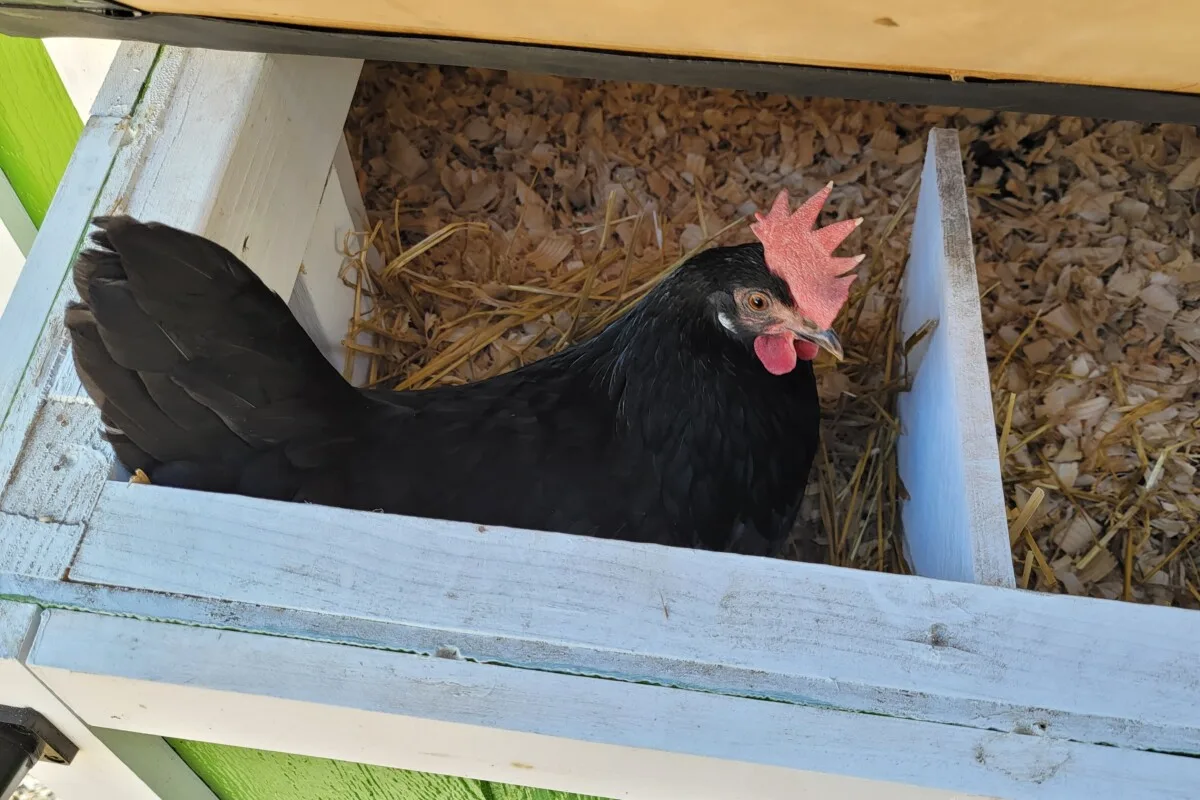
Black bears don’t all follow the exact same activity patterns, and you can certainly see black bears at any time, day or night. However, black bears are most active during dawn and dusk, and that’s when you’re most likely to have them visit your homestead.
They start foraging in the early hours of the day, before the sun comes up, and forage a lot into the night. It’s important to make sure your animals are locked up tight in a bear-proof enclosure while they’re vulnerable and sleeping.
If your goats or sheep are close to kidding and lambing, or you have a broody hen sitting on a clutch of eggs, it’s important for those extra vulnerable animals to be protected from bears. Keep these animals inside of their pens, coops, or barns while they’re giving birth and raising newborns.
Use Electric Fencing Around Livestock Living and Beehives
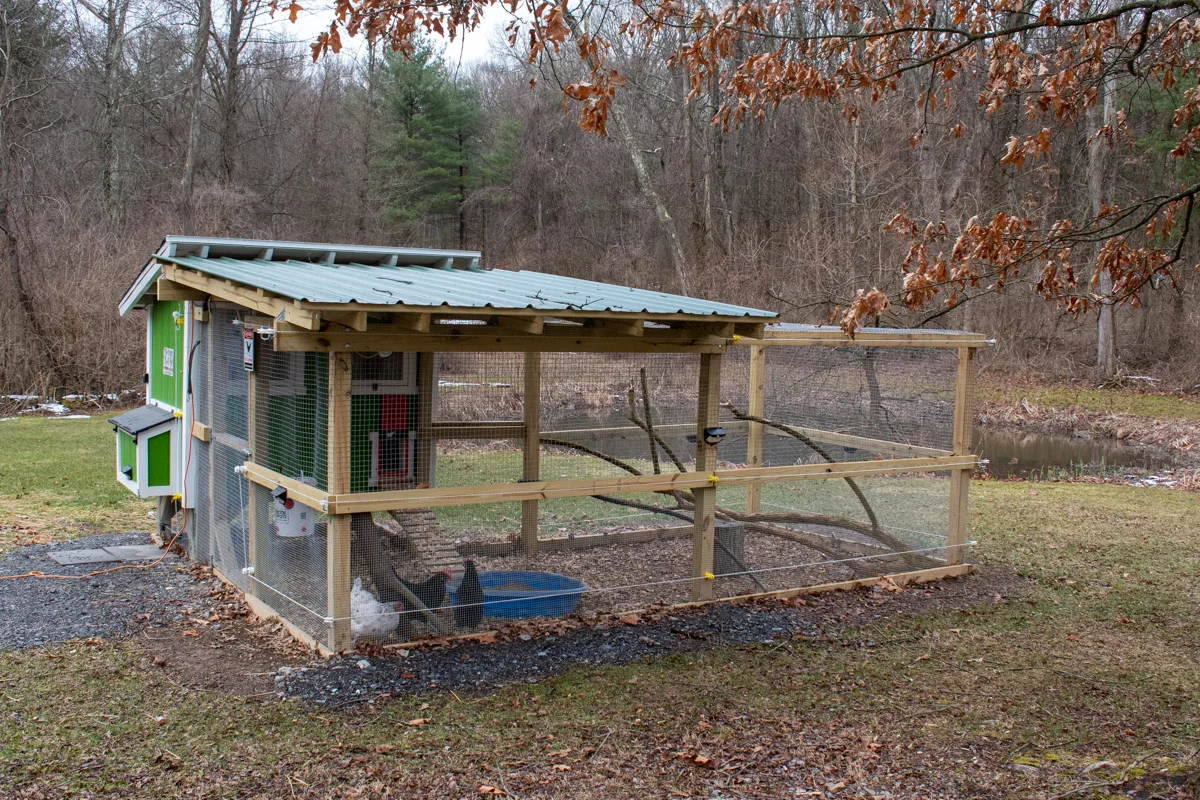
Unfortunately, standard chicken wire and hardware cloth are not strong enough to keep out a hungry bear.
Installing electric fencing around chicken coops and livestock areas is the best way to prevent bears from trying to get in.
Electric fencing is the number one way to deter bears from vulnerable areas on your homestead. I know it can be expensive to install, but it’s worthwhile if it protects your animals and your crops from hungry bears.
Don’t Leave Livestock Feed Out
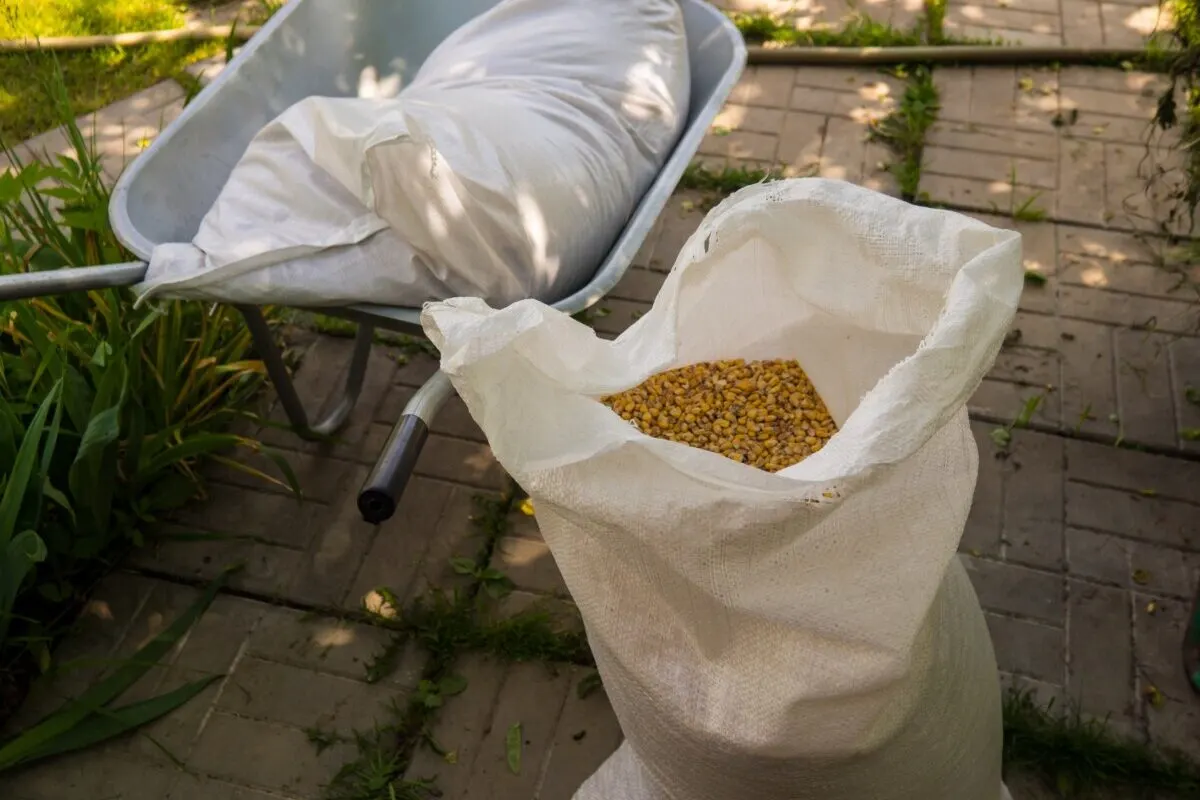
Most bears aren’t drawn to livestock because they’re interested in eating your chickens and goats. Although they could, most black bears are more interested in the easy meal that is your livestock feed. If you have buckets and bags full of feed sitting around outside, you can bet it’s going to draw bears.
Keep all livestock feed in a locked and secure shed or inside your garage or home.
Try your best to only feed the animals as much as they can eat in one sitting. I know this isn’t always possible. If you can’t limit feeding times, at least bring feeders inside and lock them up at night. Make sure your chicken coop and animal pens are as clean as possible and don’t have lots of feed mixed into the bedding.
Use Livestock Guardian Animals
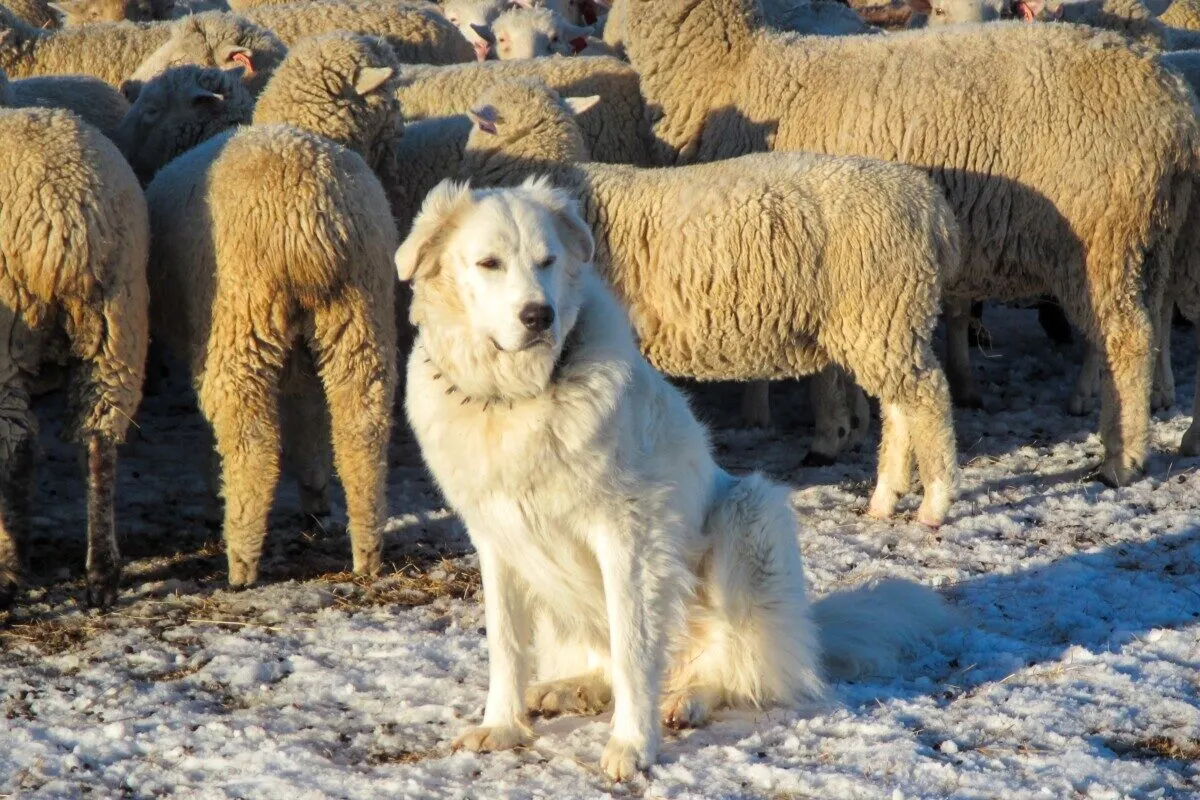
Livestock guardian dogs can help protect your animals from bears, but beware that this is not a perfect solution and can lead to other problems.
Bears and dogs don’t tend to get along, and bears may attack a livestock guardian dog who’s barking or lunging at them.
The plus side is that livestock, even simple ones like chickens, quickly come to understand that when the dog is barking, they’re in danger and need to hide. A barking dog on your homestead may be enough to save your livestock from bear attacks or keep curious bears off your property, but a hungry or desperate bear may do its worst and fight your dogs.
Related Reading: How To Train Your Chickens to Come When Called in One Week
Know When Bears Are Most Active
Spring and fall are the two times of year when bears are most active and most grumpy. In the spring, they’re coming out of hibernation, some females may have a cub or two with her, and they’re in dire need of some food. In the fall, they’re racing against the clock to eat as much as possible before denning up for the winter.
The vast majority of our bear experiences have been in the late spring and early summer, when bears are roaming our mountain in search of berries.
Simply knowing the bear’s most active times can help you to be on high alert and put in extra effort to protect your homestead.
Compost Properly
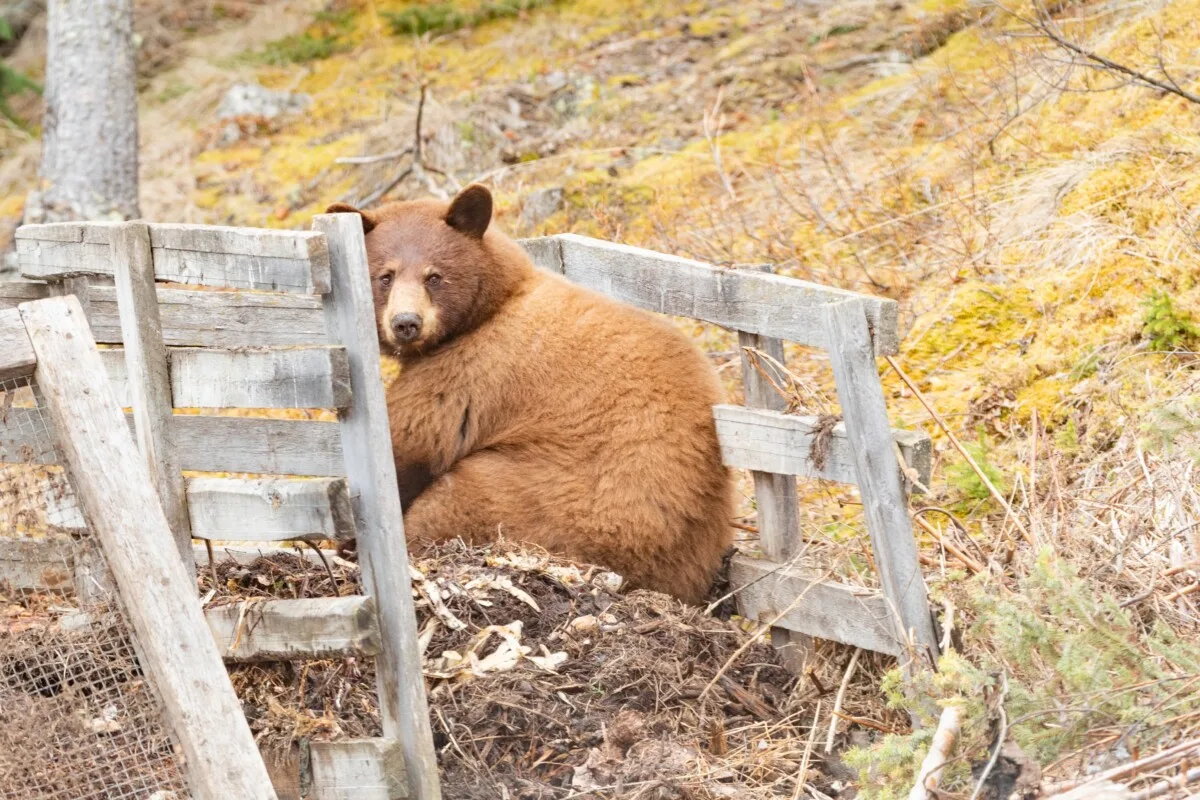
Compost is an easy meal for lots of different wild animals, including bears. Making your compost pile unappealing to wildlife will help reduce the number of visits they make to your property.
How to bear-proof your compost:
- Compost in a tumbler. There are many bear-resistant compost tumblers on the market, using them can drastically cut down on bear interest in your compost system.
- Don’t add meat scraps or bones to your compost. This is a general compost rule anyway, but following it will help to keep bears away too.
- You can also make a natural bear deterrent by soaking a rag in ammonia and placing it in a bucket near your compost pile.
It’s also important to keep your compost pile well managed by adding brown materials regularly and turning it frequently so the pile doesn’t smell of food.
Be Smart with Pet Food
Pet food is a big draw for wild animals of all sorts. Make efforts to take away this temptation for bears. Don’t feed pets outside, or if you have to, don’t leave their food outside for long periods. Try to only feed dogs and cats as much as they can eat in one sitting.
Don’t leave bags of pet food outside, even in bear-proof containers, as the smell of it can draw bears to your property.
Don’t Feed Birds During Peak Bear Season
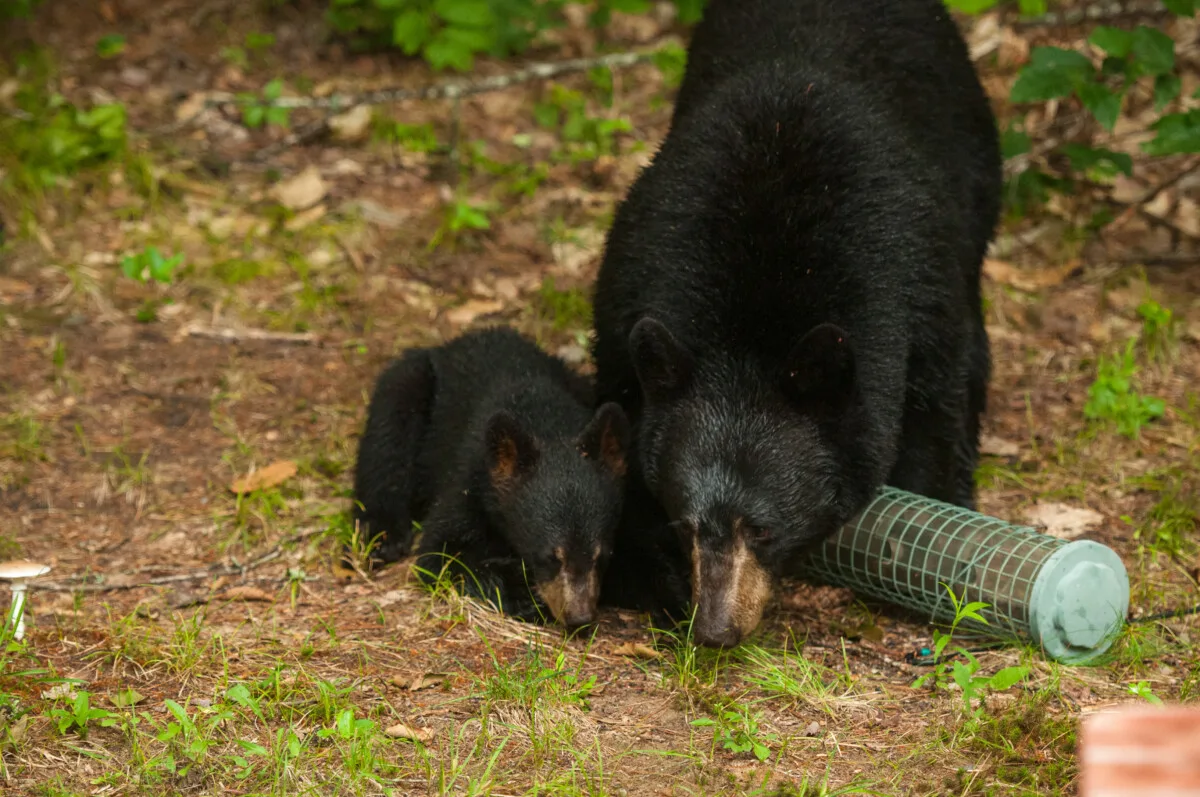
If you’ve had bears coming onto your property in search of food or raiding whatever food they find, it’s important to take every step imaginable to make your property undesirable for future bear visits.
This includes taking down bird feeders in the spring and fall when bears are most active and most in need of food.
Protect Berries or Grow Enough to Share
Black bears are berry-crazy. Berries are one of the biggest staples in their diets, and they munch on them all summer long.
Keep your berries inside electric-fenced areas if possible to keep out the bears.
If you can’t or don’t want to try to protect the berry crop, you can do what we do, which is to grow enough to share with the local wildlife. Blueberries grow very well in our climate, so we have many bushes that fill with berries every year.
We have some growing right in our yard, but also have some growing on the margins of our property, near the woodline, and those are the berries that are most targeted by wildlife. We see birds, chipmunks, squirrels, and bears munching on those berries a lot, and they rarely come into our yard to forage from the other bushes.
The animals prefer to eat close to the woods, where they can run for cover if they need to.
Bears on the homestead can certainly be a nuisance, but they don’t need to be a consistent problem. If you take steps to remove food temptations and make it clear the bear is not welcome by making noise every time it comes around and setting up electric fencing, it will find somewhere else to go.
The most important thing is to stop feeding the bears so they’ll find somewhere else to eat.

Get the famous Rural Sprout newsletter delivered to your inbox.
Including Sunday musings from our editor, Tracey, as well as “What’s Up Wednesday” our roundup of what’s in season and new article updates and alerts.

